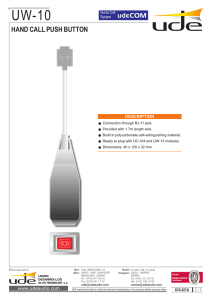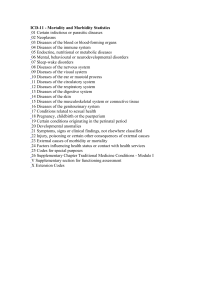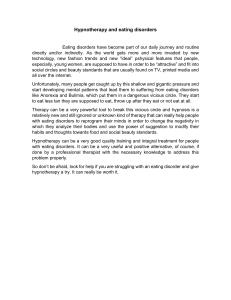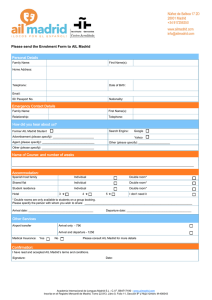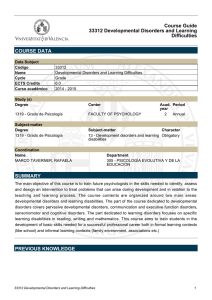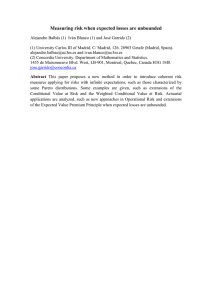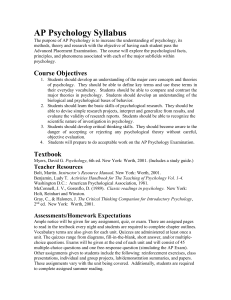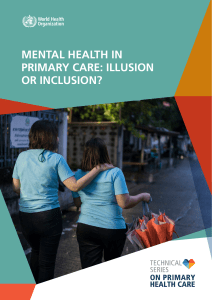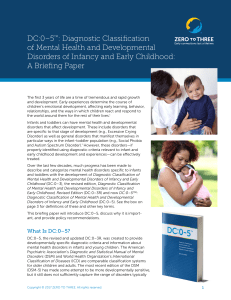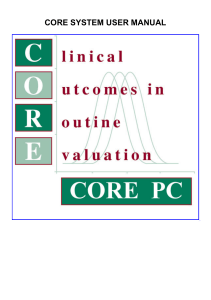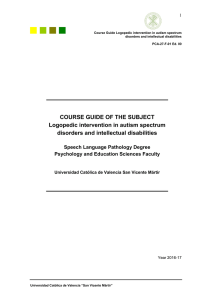PSYCHOLOGY AND MENTAL HEALTH ACADEMIC YEAR: 2016
Anuncio
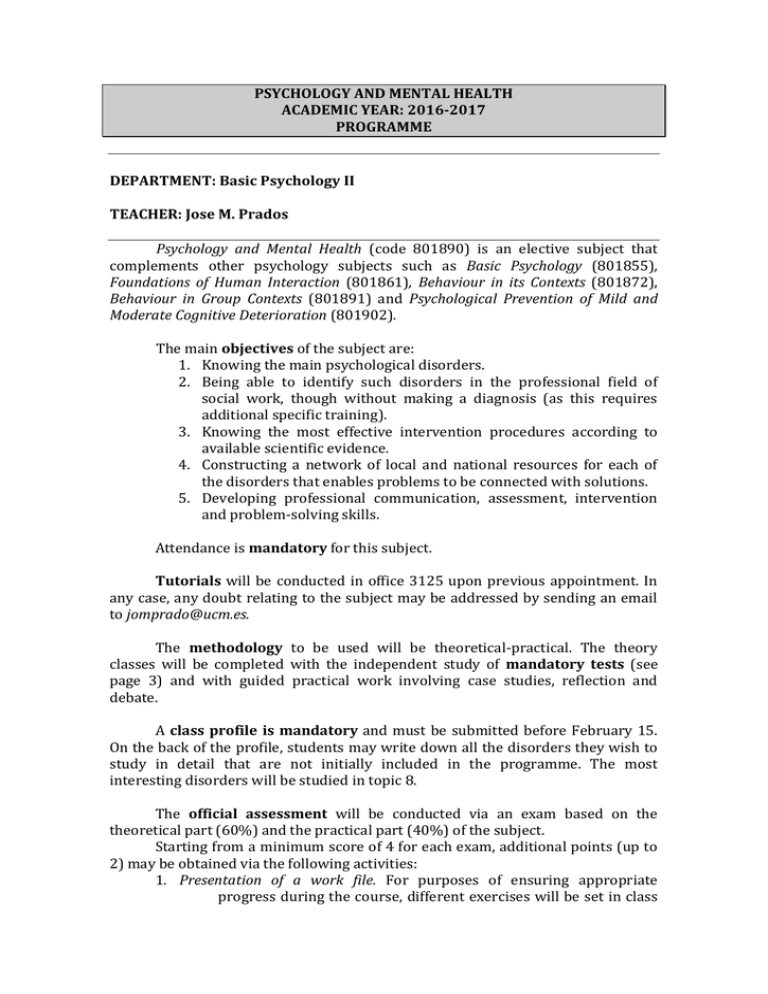
PSYCHOLOGY AND MENTAL HEALTH ACADEMIC YEAR: 2016-2017 PROGRAMME DEPARTMENT: Basic Psychology II TEACHER: Jose M. Prados Psychology and Mental Health (code 801890) is an elective subject that complements other psychology subjects such as Basic Psychology (801855), Foundations of Human Interaction (801861), Behaviour in its Contexts (801872), Behaviour in Group Contexts (801891) and Psychological Prevention of Mild and Moderate Cognitive Deterioration (801902). The main objectives of the subject are: 1. Knowing the main psychological disorders. 2. Being able to identify such disorders in the professional field of social work, though without making a diagnosis (as this requires additional specific training). 3. Knowing the most effective intervention procedures according to available scientific evidence. 4. Constructing a network of local and national resources for each of the disorders that enables problems to be connected with solutions. 5. Developing professional communication, assessment, intervention and problem-solving skills. Attendance is mandatory for this subject. Tutorials will be conducted in office 3125 upon previous appointment. In any case, any doubt relating to the subject may be addressed by sending an email to [email protected]. The methodology to be used will be theoretical-practical. The theory classes will be completed with the independent study of mandatory tests (see page 3) and with guided practical work involving case studies, reflection and debate. A class profile is mandatory and must be submitted before February 15. On the back of the profile, students may write down all the disorders they wish to study in detail that are not initially included in the programme. The most interesting disorders will be studied in topic 8. The official assessment will be conducted via an exam based on the theoretical part (60%) and the practical part (40%) of the subject. Starting from a minimum score of 4 for each exam, additional points (up to 2) may be obtained via the following activities: 1. Presentation of a work file. For purposes of ensuring appropriate progress during the course, different exercises will be set in class that can be completed in a digital file as a daily work log. The file will be submitted via email upon the teacher’s request. The file name should be: APELLIDO1_APELLIDO2_NOMBRE. For example, if a student named Lorena Gómez Pérez decides to carry out this task, she will create a Word file (or similar, such as Open Office) named GOMEZ_PEREZ_LORENA (in upper case and without accents), in which she will complete all the exercises set in class; the file must then only be submitted at the teacher’s request. The score for this activity may add up to 1 point to the final grade. 2. Research study. As preparation for the Final Degree Essay, a study may be submitted on any disorder (minimum of 10 pages). Specifically, a review may be undertaken of the last 20 pieces of research into a particular disorder, or a case study may be presented. Score up to 1 point. 3. Classroom presentations. With the teacher’s prior approval, any presentation may be made (no longer than 10 minutes) that is related with the subject (professional or personal experiences, critical commentary on a book or film, etc.). Score up to 0.25 points per presentation (maximum of 5 presentations). 4. Participation in class and in departmental studies. Participation in class and in the various studies that the department proposes during the subject will also be rewarded. Score up to 0.5 points in total. Additionally, learning-friendly attitudes (punctuality, interest, etc.) will be positively evaluated, while those which in the teacher’s judgment have the opposite effect (distraction through mobile phone use, speaking out of turn, irritating others, etc.) will be negatively evaluated. The final grade will be awarded on a scale from 0 to 10, calculated by adding the examination mark to the additional points obtained. PROGRAMME Topic 1. Introduction; Biopsychosocial approach to mental health Topic 2. Anxiety and anxiety-related disorders Topic 3. Mood disorders Topic 4. Psychotic disorders Topic 5. Impulse control disorders Topic 6. Eating disorders Topic 7. Personality disorders Topic 8. Other interesting disorders MANDATORY TEXTS Barlow, D., and Durand, V. M. (2003). Psicopatología (3ª ed.). Madrid: Thomson. (later editions may also be used). This book is considered one of the finest texts in the specialist area. Its authors, David Barlow and Mark Durand, offer us a comprehensive perspective of psychological disorders, emphasizing the reciprocal influences of behaviour, emotions, biology and the sociocultural context. They also describe numerous real cases that assist us in attaining a better understanding of each disorder, as well as the most effective assessment and treatment procedures. RECOMMENDED BIBLIOGRAPHY American Psychiatric Association (2013). Diagnostic and statistical manual of mental disorders (5th Ed.) Washington, DC: Author. Beck, A., Rush, A., Shaw, B., and Emery, G. (1983). Terapia cognitiva de la depresión. Bilbao: Desclée de Brouwer Foa, E. B., Keane, T. M., and Friedman, M. J. (Eds.). (2003). Tratamiento del estrés postraumático. Barcelona: Ariel. Knapp, H. (2007). Therapeutic communication: Developing professional skills. Thousand Oaks, CA: Sage. Kriz, J. (2001). Corrientes fundamentales en psicoterapia. Buenos Aires: Amorrortu. Labrador, F. J. (Coord.) (2011). Situaciones difíciles en terapia. Madrid: Pirámide. Leader, D. (2015). Estrictamente bipolar. México: Sexto Piso. Linehan, M. M. (2003). Manual de tratamiento de los trastornos de personalidad límite. Barcelona: Paidós. Mingote Adán, J. C. (2004). Suicidio: Asistencia clínica. Guía práctica de psiquiatría médica. Madrid: Díaz de Santos. Navarro, J. F. (Coord.) (2000). Bases biológicas de las psicopatologías. Madrid: Pirámide. Olivares Rodríguez, J., Macià Antón, D., Rosa Alcázar, A. I., and Olivares-Olivares, P. J. (2013). Intervención psicológica. Estrategias, técnicas y tratamiento. Madrid: Pirámide. Prados, J. M. (2008). Ansiedad generalizada. Madrid: Síntesis. Raich, R. M. (2011). Anorexia, bulimia y otros trastornos alimentarios. Madrid: Pirámide. Rodríguez González, A. (1998). Rehabilitación psicosocial de personas con trastornos mentales crónicos. Madrid: Pirámide. Sarason, I. G., y Sarason, B. R. (2006). Psicopatología. Psicología anormal: el problema de la conducta inadaptada (11ª Ed.). México: Pearson Educación. Spitzer, R. L., Gibbon, M., Skodol, A. E., Williams, J. B. W., and First, M. B. (1996). DSM-IV. Libro de casos. Barcelona: Masson. Stahl, S. M. (2002). Psicofarmacología esencial (2ª Ed.). Barcelona: Ariel. Vallejo Ruiloba, J. (2006). Psiquiatría para no expertos: conozca los problemas más frecuentes. Barcelona: Ars Comunicación.
